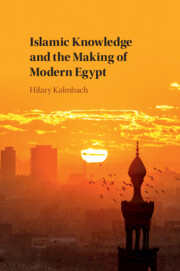Book contents
- Islamic Knowledge and the Making of Modern Egypt
- Islamic Knowledge and the Making of Modern Egypt
- Copyright page
- Dedication
- Contents
- Figures
- Acknowledgements
- Preface
- Notes on Transliteration and Use of Arabic
- Introduction: Hybridity, Islamic Knowledge, and ‘Being Modern’ in Egypt
- 1 Reform, Education, and Sociocultural Politics in Nineteenth-Century Egypt
- 2 Dar al-ʿUlum: Hybridity, Education, and Sociocultural Change, 1871–1900
- 3 Hybridity, Islamic Knowledge, and the Formation of Egyptian National Culture, 1882–1922
- 4 Fighting over the Future of Egyptian National Culture, 1923–1952
- Conclusion: Authority, Authenticity, and Revolution
- Book part
- Bibliography
- Index
4 - Fighting over the Future of Egyptian National Culture, 1923–1952
Published online by Cambridge University Press: 02 October 2020
- Islamic Knowledge and the Making of Modern Egypt
- Islamic Knowledge and the Making of Modern Egypt
- Copyright page
- Dedication
- Contents
- Figures
- Acknowledgements
- Preface
- Notes on Transliteration and Use of Arabic
- Introduction: Hybridity, Islamic Knowledge, and ‘Being Modern’ in Egypt
- 1 Reform, Education, and Sociocultural Politics in Nineteenth-Century Egypt
- 2 Dar al-ʿUlum: Hybridity, Education, and Sociocultural Change, 1871–1900
- 3 Hybridity, Islamic Knowledge, and the Formation of Egyptian National Culture, 1882–1922
- 4 Fighting over the Future of Egyptian National Culture, 1923–1952
- Conclusion: Authority, Authenticity, and Revolution
- Book part
- Bibliography
- Index
Summary
This chapter rewrites the history of Egypt’s constitutional period (1923–1952) by examining a ‘culture war’ that broke out between graduates of Dar al-ʿUlum and Europhile modernist intellectuals such as Muhammad Husayn Haykal, Taha Husayn, and ʿAli ʿAbd al-Raziq. From 1930, Europhile modernist calls for westernisation fell on deaf ears due in large part to the darʿamiyya. Darʿamiyya continued to exercise significant influence over the teaching and reform of Arabic, including as members of the Royal Arabic Language Academy (Majmaʿ al-Lugha al-ʿArabiyya) from 1932. Furthermore, darʿamiyya Hasan al-Banna and Sayyid Qutb of the Muslim Brotherhood and Taqi al-Din al-Nabhani of Hizb al-Tahrir advanced explicitly Islamic alternatives to state-led projects of modernity. Their example established a new mode of religious leadership, the new religious intellectual, available to individuals without significant religious education. Europhile modernists responded differently to this loss of sociocultural authority. Haykal’s switch to writing about Islamic topics can be seen as an attempt to co-opt darʿami influence over popular views of religion. Husayn’s call for Dar al-ʿUlum to be subsumed into the Egyptian University’s College of Literature was a direct attack on the darʿamiyya’s sociocultural and professional authority.
Keywords
- Type
- Chapter
- Information
- Islamic Knowledge and the Making of Modern Egypt , pp. 164 - 205Publisher: Cambridge University PressPrint publication year: 2020



